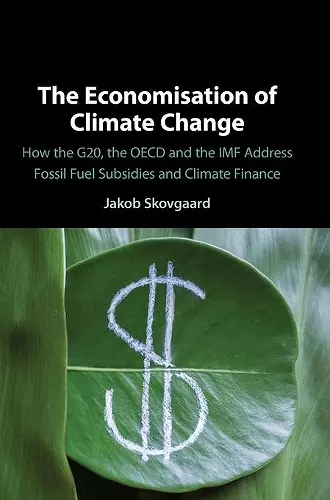The Economisation of Climate Change
How the G20, the OECD and the IMF Address Fossil Fuel Subsidies and Climate Finance
Format:Hardback
Publisher:Cambridge University Press
Published:25th Mar '21
Currently unavailable, and unfortunately no date known when it will be back

Discusses how G20, IMF and OECD have addressed climate finance and fossil fuel subsidies, including consequences for climate politics.
International economic institutions economise climate change, treating it as an economic rather than environmental issue. This book explores how three such institutions - G20, IMF, OECD - have addressed climate finance and fossil fuel subsidies, and the consequences of the economisation of climate change. Also available as Open Access.The effort to address climate change cuts across a wide range of non-environmental actors and policy areas, including international economic institutions such as the Group of Twenty (G20), International Monetary Fund (IMF), and the Organisation for Economic Co-operation and Development (OECD). These institutions do not tend to address climate change so much as an environmental issue, but as an economic one, a dynamic referred to as 'economisation'. Such economisation can have profound consequences for how environmental problems are addressed. This book explores how the G20, IMF, and OECD have addressed climate finance and fossil fuel subsidies, what factors have shaped their specific approaches, and the consequences of this economisation of climate change. Focusing on the international level, it is a valuable resource for graduate students, researchers, and policymakers in the fields of politics, political economy and environmental policy. This title is also available as Open Access.
'Skovgaard's excellent book explores how the IMF, OECD and G20 address the global threat of climate change and frame it as an economic issue. It provides a timely analysis of the increasing economisation of climate policy - its strengths and limitations. Most importantly, it shines a light on the questions of power and justice that are often hidden in economic discourses.' Robert Falkner, London School of Economics and Political Science
'Climate change can be reduced to the failure of the economic system to adequately recognize and price the short and long term benefits and costs of economic activity. After years of progress on climate change in the scientific, civil society, and environmental sphere, climate change is starting to become 'mainstreamed' by the G20, IMF, and beyond. While Skovgaard recognizes that in some ways permeation of core international economic institutions is paramount to tackling the climate challenge, he also shows how these institutions 'economize' climate change in a manner that may result in the fox guarding the henhouse. This book is essential reading for those wishing to trace the evolution of climate policy from scientific communities and civil society to the halls of economic power in order to help us understand the nature of the challenge for scholars and policy makers alike.' Kevin P. Gallagher, Boston University
'The need to shift the way finance operates is now widely recognized as essential for the societal transformations necessary to prevent dangerous climate change. Skovgaard's careful and sobering analysis shows both the power of three key global institutions - the IMF, G20, and OECD - to influence major financial reforms like ending fossil fuel subsidies, but also how their worldviews reinforce current practices that militate against the needed paradigm shift in climate finance. Anyone who wants to understand the opportunities and limits of these institutions' economization of climate change will want to read this book.' Steven Bernstein, University of Toronto
ISBN: 9781108492836
Dimensions: 250mm x 175mm x 20mm
Weight: 660g
296 pages